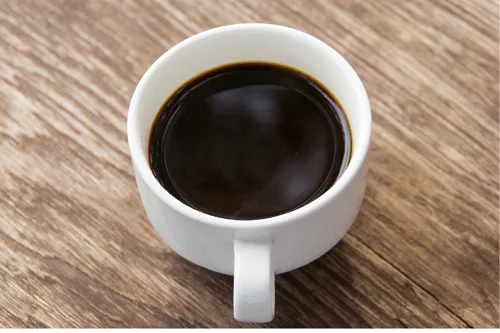Coffee
Why Does Black Coffee Taste Bitter?
Why Does Black Coffee Taste Bitter? Black coffee, the elixir of the morning, has garnered a devoted following of enthusiasts who relish its robustness and simplicity. It stands in stark contrast to its adorned counterparts with elaborate names and indulgent add-ins. Yet, amidst its revered status, a question lingers—why does it often carry a bitter bite?
Black coffee can be stronger than regular coffee, but it’s earned a bad reputation for its bitterness. But what causes black coffee to taste bitter, and does all black coffee taste like this? Black coffee tastes bitter because it contains more caffeine than other coffee types. However, using low-quality beans, a darker roast, or the wrong grind size can also increase coffee’s bitterness. Over-extraction is also a common cause of bitter black coffee.”
What Causes the Bitterness in Black Coffee
When it comes to the distinct bitterness of black coffee, there are several factors at play that contribute to this characteristic taste. Unlike decaffeinated coffee, where the caffeine content is intentionally reduced, the brewing process of black coffee preserves the caffeine, resulting in a potential caffeine concentration that is 10-15% higher compared to other coffee types.
Interestingly, the beans themselves can play a role in the bitterness of your cup of black coffee. If you are using coffee beans that inherently possess higher levels of caffeine, the resultant brew is likely to exhibit a more pronounced bitterness.
Beyond the caffeine content and bean selection, the brewing process also has an impact on the taste profile of black coffee. While many individuals appreciate the sharp and robust flavor of black coffee, additional bitterness can arise due to specific variables during brewing.
For instance, over-extraction, a scenario where water interacts with the coffee grounds for too long, can lead to heightened bitterness. Similarly, the extent to which coffee beans are roasted can influence bitterness, with beans that are roasted excessively resulting in a more bitter taste.
Furthermore, the temperature at which coffee is brewed can also be a contributing factor. If the water temperature is too high during the brewing process, it can extract compounds from the coffee grounds that contribute to bitterness.
The Bitter Truth: Understanding the Bitterness in Black Coffee
The allure of black coffee lies not only in its caffeine punch but also in its bitter notes. However, deciphering the origin of this bitterness unveils a story of complex chemistry. The primary reason behind black coffee’s bitterness is its heightened caffeine content. Unlike decaf coffee, where caffeine is removed, black coffee retains a substantial amount, making it inherently bolder and potentially more bitter.
Factors Influencing the Bitterness of Black Coffee
3.1 Caffeine Content: The Culprit Behind Bitterness
The bitterness is closely intertwined with the caffeine levels present in black coffee. Beans with higher caffeine concentrations, often preferred for their potency, contribute to the intense bitterness. Those seeking milder flavors might opt for beans with lower caffeine content, such as those grown at higher altitudes, which are known to be less bitter.
3.2 Bean Quality and Origin: The Role of Altitude
The altitude at which coffee beans are cultivated plays a significant role in determining their bitterness. Beans from higher altitudes tend to be less bitter due to their slower growth and maturation process, resulting in smoother flavors. The processing method, whether wet or dry, and the bean strain, such as Arabica vs. Robusta, also impact bitterness.
3.3 Roasting Levels: From Light to Dark
Roasting levels introduce an intriguing twist to the bitterness equation. Darker roast beans, commonly used for black coffee, can harbor heightened bitterness due to the caramelization of sugars during roasting. On the other hand, medium and light roast beans offer distinct flavor profiles, allowing for experimentation in finding the right balance between bitterness and other notes.
3.4 Extraction Process: Striking the Balance
The art of extraction influences the bitterness profoundly. Over-extraction, resulting from leaving coffee grounds in water for extended periods, intensifies bitterness by drawing out excessive compounds. Achieving the perfect extraction time, aided by using the right water-to-coffee ratio, is crucial for a balanced cup.
3.5 Grinding Size: Finding the Right Texture
Grinding size carries the power to alter bitterness. Finely ground beans accelerate flavor release, increasing the risk of over-extraction. Opting for medium ground beans strikes a balance between flavor extraction and bitterness.
The Art of Brewing Sweeter Black Coffee
4.1 Embracing Medium Roast Beans
To embark on a journey to sweeter black coffee, consider the switch to medium roast beans. These beans retain nuanced flavors and possess reduced bitterness compared to their darker counterparts.
4.2 Mastery Over Extraction
Controlling the extraction process requires precision. Carefully measuring water and adjusting extraction time can lead to a smoother, less bitter brew. Utilizing medium-ground beans further mitigates bitterness risks.
4.3 Emphasizing Freshness
Freshness holds the key to unlocking delightful flavors. Storing beans for extended periods diminishes their vibrancy and intensifies bitterness. Opt for smaller quantities to ensure the beans remain at their peak.
4.4 Quality Over Quantity: Choosing Premium Beans
Investing in high-quality beans, particularly Arabica varieties, provides a passport to a less bitter coffee experience. Arabica beans boast intricate flavors that offset bitterness, making them an excellent choice for those seeking a sweeter cup.
Conclusion: A Sip of Sweetness in Every Cup
Why Does Black Coffee Taste Bitter? In the realm of black coffee, bitterness need not be an indomitable force. By understanding the interplay of factors contributing to bitterness, one can craft a cup of black coffee that entices with its richness rather than overwhelming with bitterness. With the right beans, brewing methods, and a dash of experimentation, a satisfyingly sweet black coffee is well within reach.
FAQs
1. Is black coffee always bitter?
While black coffee often carries bitter notes, its bitterness can be influenced by various factors such as bean type, roast level, and brewing method. With careful choices and brewing techniques, you can enjoy black coffee with varying degrees of bitterness.
2. Can I reduce bitterness in black coffee without sacrificing caffeine content?
Yes, you can. Bitterness in black coffee is not solely linked to caffeine content. Adjusting factors like bean quality, roast level, extraction time, and water-to-coffee ratio can help reduce bitterness while preserving caffeine levels.
3. Is there a specific brewing method for making black coffee less bitter?
There isn’t a one-size-fits-all method, but certain practices can help. Opt for medium roast beans, control extraction time, use medium ground beans, and brew at the right temperature. Experiment with these factors to find the method that suits your taste.
4. How does water temperature impact bitterness in black coffee?
Water temperature plays a critical role. Water that’s too hot can extract undesirable bitter compounds. Brewing at around 200°F (93°C) allows the extraction of sugars without extracting excessive bitterness, resulting in a smoother cup of black coffee.
5. Can flavored additives counteract bitterness in black coffee?
Flavored additives might mask bitterness to some extent, but they won’t fully counteract it. Instead of additives, focus on using high-quality beans, adjusting brewing techniques, and experimenting with factors that impact bitterness for a more balanced and enjoyable black coffee experience.

